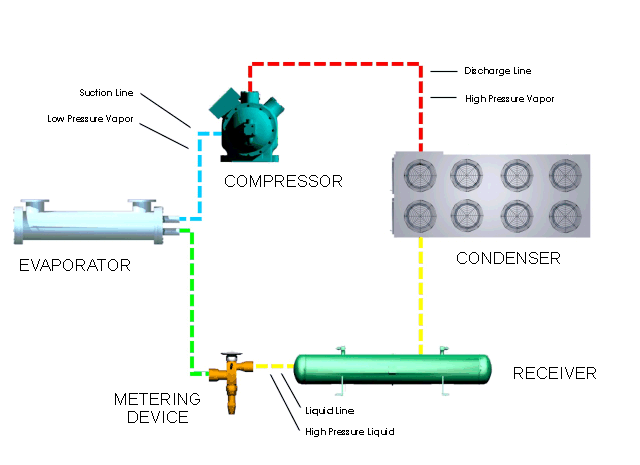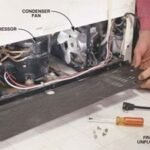Your fridge compressor should run about 4-8 hours per day. This depends on usage, ambient temperature, and fridge settings.

Understanding how often your fridge compressor should run is essential for maintaining energy efficiency and appliance longevity—the compressor cycles on and off to maintain the ideal temperature inside the fridge. Frequent cycling or prolonged running could indicate a problem, such as poor insulation or a failing component.
Monitoring these cycles ensures your fridge operates efficiently, saving energy and reducing wear and tear. Regular maintenance and proper usage contribute significantly to optimal compressor performance, keeping your food fresh and energy bills low. Knowing these details helps make informed decisions about fridge care and potential repairs.

Credit: www.torr-engineering.com
Fridge Compressor Basics
Understanding how your fridge compressor works is critical to maintaining efficiency. The compressor plays a vital role in keeping your food fresh. This section will explore the basics of a fridge compressor.
Role Of The Compressor
The compressor is the heart of your fridge. Its main job is to circulate refrigerant. This helps in cooling the fridge interior. The compressor also maintains the right temperature. It works by compressing the refrigerant, making it hotter. This hot gas then moves through the coils. As it cools, it turns into a liquid. This cycle repeats to keep your fridge cold.
How It Works
The compressor starts when the thermostat signals a temperature rise. The refrigerant absorbs heat inside the fridge. It then flows to the compressor as a gas. The compressor compresses this gas, raising its temperature and pressure. The hot gas then moves to the condenser coils. Here, it releases heat and turns back into a liquid. The liquid refrigerant then moves to the evaporator coils. In the evaporator, it absorbs heat and cools the fridge interior. This cycle continues to keep your fridge at the set temperature.
To summarize, the compressor is essential for your fridge’s cooling cycle. You can better maintain your fridge by understanding its role and how it works.
Normal Compressor Cycles
Understanding the regular compressor cycles of your fridge is essential. It helps maintain efficiency and ensures your food stays fresh. The compressor is the heart of your refrigerator. It works to keep the internal temperature at the right level.
Typical Run Times
The typical run time for a fridge compressor varies. A fridge compressor runs for about 4 to 8 hours per day. This depends on the size and model of the fridge. Some modern refrigerators have more efficient compressors. These may run for shorter durations but more frequently.
Older models may have longer run times. They may not be as energy-efficient. It’s essential to know the run time of your fridge. This helps identify any potential issues early.
Factors Affecting Cycles
Several factors affect the compressor cycles of your fridge. These include:
- Room Temperature: Higher room temperatures increase compressor run times.
- Door Usage: Opening the door frequently affects the internal temperature.
- Fridge Load: A full fridge requires the compressor to work harder.
- Thermostat Setting: Lower settings make the compressor run more often.
Understanding these factors helps in optimizing the efficiency of your fridge. For example, keeping the fridge door closed as much as possible can reduce compressor run time.
| Factor | Effect on Compressor Cycle |
|---|---|
| Room Temperature | Higher temperatures increase run time. |
| Door Usage | Frequent openings increase run time. |
| Fridge Load | Full fridge increases run time. |
| Thermostat Setting | Lower settings increase run time. |
Regular maintenance also plays a crucial role. Cleaning the coils and checking the seals can improve efficiency. If you notice your compressor running continuously, it might signal a problem. Consulting a professional can help in such cases.
Signs Of A Healthy Compressor
Understanding the signs of a healthy compressor can help you maintain your fridge. A well-functioning compressor ensures efficiency and longevity. Here are the key indicators to look out for:
Consistent Temperature
A healthy compressor maintains a consistent temperature inside the fridge. You should not find any warm spots. Use a thermometer to check the temperature. It should stay between 35°F and 38°F (1.7°C to 3.3°C).
If the temperature fluctuates, the compressor might be failing. Regular checks can prevent food spoilage. A steady temperature means the compressor is working well.
Noise Levels
Your fridge should run quietly. A healthy compressor makes only a soft hum. Loud noises indicate issues. Listen for unusual sounds like rattling or buzzing. These noises can signal a problem.
Use this table to understand noise levels:
| Noise Type | Indication |
|---|---|
| Soft Hum | Healthy Compressor |
| Loud Clanking | Possible Failure |
| Buzzing | Potential Issue |
Regularly check your fridge’s noise levels. Keep it running smoothly for longer.

Credit: www.reddit.com
Efficiency And Energy Usage
Understanding how often your fridge compressor runs is critical to energy efficiency. The compressor’s cycles affect your fridge’s energy consumption. Proper management ensures your fridge runs efficiently and saves on electricity costs.
Energy-saving Tips
- Keep your fridge’s temperature between 37°F to 40°F.
- Ensure proper ventilation around your fridge.
- Regularly clean the condenser coils to improve efficiency.
- Minimize door openings to maintain a stable temperature.
- Check door seals for leaks to prevent cold air loss.
Impact On Electricity Bills
Fridge compressors running too often can increase electricity bills. Efficient compressors use less energy, reducing overall costs. Regular maintenance helps keep the compressor running efficiently, saving money.
| Compressor Run Time | Energy Usage |
|---|---|
| Short Cycles | Higher Energy Consumption |
| Optimized Cycles | Lower Energy Consumption |
By understanding compressor cycles, you can manage energy usage better. This knowledge helps in reducing electricity bills effectively.
Common Issues
Understanding how often your fridge compressor should run is crucial. Inefficient compressor cycles can lead to various common issues. Let’s explore some of the most frequent problems you may encounter.
Overheating
Overheating is a primary concern for fridge compressors. When a compressor runs too often, it can get too hot. This can cause the compressor to fail. Overheating can also lead to higher energy bills.
Here are some signs your compressor is overheating:
- Warm air inside the fridge
- Unusual noises
- Frequent compressor shutdowns
To prevent overheating, ensure good airflow around the fridge. Clean the condenser coils regularly. Keep the refrigerator in a cool place, away from direct sunlight.
Frequent Cycling
Frequent cycling means the compressor turns on and off too often. This can wear out the compressor faster. It can also lead to inconsistent fridge temperatures.
Common causes of frequent cycling include:
| Issue | Description |
|---|---|
| Dirty Condenser Coils | Dirt and dust can block coils, causing the compressor to overwork. |
| Thermostat Issues | A faulty thermostat can lead to incorrect temperature readings. |
| Poor Door Seals | Warm air can enter the fridge, causing the compressor to run more. |
To reduce frequent cycling, clean the condenser coils. Check the thermostat settings. Inspect the door seals for any gaps or cracks.
Maintenance Tips
Regular maintenance can help your fridge compressor run efficiently. Proper upkeep ensures it doesn’t overwork, which can increase energy consumption and shorten its lifespan. Here are some essential maintenance tips to keep your fridge compressor running smoothly.
Cleaning Coils
The coils are crucial for your fridge’s cooling process. Dust and dirt can accumulate on them, making the compressor work harder.
- Locate the coils: These are typically at the back or bottom of the fridge.
- Unplug the fridge: Always unplug the appliance before cleaning to avoid electric shock.
- Use a coil brush: Special brushes are designed to clean coils efficiently.
- Vacuum: Use a vacuum cleaner to remove the dust and debris.
Clean the coils every six months for optimal efficiency. Dirty coils can increase the compressor’s runtime, increasing energy bills.
Checking Seals
The door seals (gaskets) are essential for keeping cold air inside the fridge. Damaged or dirty seals can cause the compressor to run more frequently.
- Inspect the seals: Look for cracks, tears, or any signs of wear.
- Perform the paper test: Close the door on a piece of paper. If it slides out quickly, the seal may need replacing.
- Clean the seals: Use warm water and mild detergent to clean any dirt or grime.
- Replace if necessary: If the seals are damaged, replace them promptly.
Keeping the seals in good condition ensures that cold air stays in. This reduces the compressor’s workload and enhances energy efficiency.
By following these maintenance tips, you can extend the life of your fridge compressor. This will also keep your energy bills in check.
When To Call A Professional
Knowing when to call a professional for your fridge compressor is crucial. It ensures your appliance runs efficiently and avoids costly repairs. Here are vital signs that indicate you should seek professional help.
Unusual Noises
It is a red flag if your fridge makes loud or strange noises. A noisy compressor might indicate mechanical issues. Listen for these types of sounds:
- Clicking: This could mean the start relay is failing.
- Buzzing: Often a sign of electrical problems.
- Grinding: This usually indicates worn-out parts.
Unusual noises should not be ignored. They might signal serious issues.
Inefficient Cooling
Is your fridge not keeping food cold? This is a sign of compressor issues. Inefficient cooling can spoil food quickly. Check for these symptoms:
| Symptom | Possible Issue |
|---|---|
| Warm Fridge | Compressor not running properly |
| Ice Build-up | Blocked vents or faulty compressor |
| Short Cycles | Thermostat or compressor problems |
Addressing inefficient cooling promptly can prevent more significant issues.
If you notice any of these symptoms, call a professional. They have the expertise to diagnose and fix the problem correctly.
Choosing An Efficient Fridge
Choosing an efficient fridge is vital for energy saving and performance. An efficient fridge ensures optimal cooling and reduces electricity bills. Knowing the features to look for can help you make an informed decision.
Energy Star Ratings
Energy Star-rated fridges are among the most energy-efficient models available. These fridges consume less power, saving you money on electricity bills. Look for the Energy Star label when purchasing a new fridge. This label indicates the appliance meets strict energy efficiency guidelines.
Energy Star fridges often include advanced compressors and better insulation. This results in less energy consumption. The initial cost may be higher, but long-term savings on utility bills are significant.
Modern Features
Modern fridges come with features that enhance efficiency. Here are some features to consider:
- Inverter Technology: Adjusts the compressor speed based on cooling needs. This results in less energy usage.
- Smart Sensors: Detects temperature changes and adjusts cooling accordingly. Maintains a consistent temperature inside the fridge.
- LED Lighting: Consumes less power than traditional bulbs. Provides better illumination inside the fridge.
- Dual Evaporators: Separate cooling systems for the fridge and freezer. It keeps food fresh for longer and reduces energy use.
- Auto-Defrost: Prevents ice build-up, ensuring the fridge runs efficiently.
Choosing a fridge with these features can significantly reduce energy consumption. This keeps your food fresh and your electricity bill low.

Credit: berg-group.com
Frequently Asked Questions
How Often Should My Refrigerator Cycle on and Off?
A refrigerator typically cycles on and off every 30 minutes. This can vary based on usage and room temperature. Ensure your fridge door seals properly to maintain efficiency.
How Long Should a Fridge Compressor Run at a Time?
A fridge compressor typically runs for 4-8 hours at a time. It depends on usage and ambient temperature.
Does Refrigerator Compressor Run Constantly?
No, a refrigerator compressor does not run constantly. It cycles on and off to maintain the set temperature. Regular cycling is normal.
Why Does My Refrigerator Run Every 20 Minutes?
Your refrigerator runs every 20 minutes due to frequent door openings, faulty thermostat, or dirty condenser coils.
Conclusion
Understanding your fridge compressor’s running cycles can enhance efficiency. Regular checks ensure optimal performance. Keep your fridge well-maintained to avoid costly repairs. A well-functioning compressor saves energy and prolongs appliance life. Stay informed to ensure your fridge operates smoothly, keeping food’s freshness and energy bills low.


GIPHY App Key not set. Please check settings